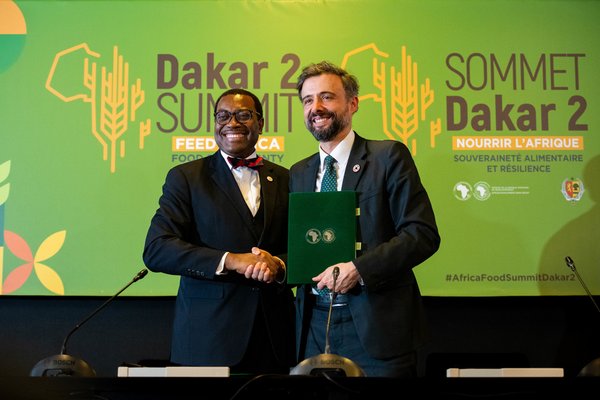 Read this article in French
Read this article in French- Share this article
- Subscribe to our newsletter
Unlocking Africa’s agricultural capability
Thirty-four heads of state and government, 70 government ministers and development partners met at the Second Africa Food Summit in Dakar from the 25th – 27th January, under the theme Feed Africa: food sovereignty and resilience. The Summit was organised by the Senegalese Government and the African Development Bank (AfDB).
At the summit, development partners agreed to commit USD 30 billion to back the continent’s resolve to boost agricultural productivity and become a breadbasket for the world. Among the development partners are the AfDB which plans to contribute USD ten billion over five years, and the Islamic Development Bank, which intends to provide USD five billion.
In the Dakar Declaration, the leaders agreed to allocate at least ten per cent of public expenditure to increase funding for agriculture. They also resolved to deploy robust production packages to boost productivity and increase resilience to achieve food security and self-sufficiency.
Participants developed Country Food and Agriculture Delivery Compacts in order to transform agriculture across Africa. In their Declaration, they acknowledge that “these Compacts were prepared and are owned by African countries, which convey the vision, challenges, and opportunities in agricultural productivity, infrastructure, processing and value addition, markets and financing that will accelerate the implementation of the African Union’s Comprehensive Africa Agriculture Development Program (CAADP)”.
Mission 1 for 200
At the summit, the AfDB and the UN’s International Fund for Agricultural Development (IFAD) teamed up to help 40 million African farmers through a new initiative that aims to double productivity and produce 100 million metric tons of food for 200 million people. The Mission 1 for 200 (M1-200) initiative aims to reduce Africa’s food import dependency, and build sustainable, inclusive and climate-adapted food systems. New investment partners and much needed sources of funding for Africa are sought out under this new programme.
M1-200 seeks to attract investments to boost small and medium enterprises in the agriculture sector. The initiative will ensure that small-scale food producers across the agriculture value chain are included and that additional jobs are created for those who need one.
M1-200 builds on the AfDB’s flagship Feed Africa strategy and complements IFAD’s core programmes, including its portfolio of investments in the areas of inclusive rural transformation, agricultural development, nutrition and food security, and climate adaptation, all of which is geared towards supporting small-scale farmers as the cornerstone of food systems transformation.
This new agreement reinforces the previous commitment that IFAD and AfBD have to boost agricultural production by doubling productivity levels through expanding existing agro-technologies, investing in access to markets, and promoting agricultural research and development.
Investing in lending to women entrepreneurs in Africa
The AfDB’s Affirmative Finance Action for Women in Africa (AFAWA) initiative had reached a landmark USD one billion in approved funding designated for lending to African women entrepreneurs, AfDB Vice President Beth Dunford announced at the Summit. AFAWA was launched in Dakar in 2015, during the first Feed Africa conference (Dakar 1 Africa Food Summit).
Women run the majority of Africa’s agricultural sector small and medium-sized enterprises (SMEs), yet they face significant barriers to accessing finance. Across the continent, African women entrepreneurs have to cope with an estimated USD 42 billion gender financing gap compared to men.
In the last two years, the Bank, through AFAWA, has multiplied the volume of investments toward women-owned small and medium enterprises sevenfold.
The Agri-food SME Catalytic Financing Mechanism
The AfDB and the Government of Canada have established a new special fund to support Africa’s small and medium-sized enterprises (SMEs) in the agriculture sector, as they announced at a press event during the Dakar 2 Africa Food Summit.
The Agri-food SME Catalytic Financing Mechanism aims to catalyse and de-risk investment for agriculture SMEs, as well as strengthen agricultural value chains and improve food security across the continent.
Small and medium agri-businesses produce, process or transport around 65 per cent of Africa’s food, yet they face a financing gap of more than USD 180 million annually.
The mechanism will provide concessional finance and technical assistance to financial intermediaries including agribusinesses, micro-finance institutions and impact funds. The finance and assistance aim to enable the intermediaries to provide loans for agri-SMEs working with women, and businesses that build resilience to climate change.
The Agri-food SME Catalytic Financing Mechanism will add to the Bank Group Affirmative Finance Action for Women in Africa’s (AFAWA) goal of closing the access to finance gap for women-led SMEs referred to above and to accelerating their growth.
(AfDB/ile)





Add a comment
Comments :